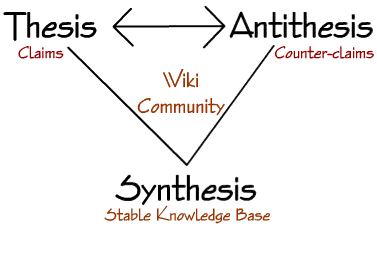Through the Looking Monitor: Alice in Wikiland
 Wikis and Rhetorical Knowledge
Wikis and Rhetorical Knowledge
In the community created by a wiki, knowledge is shared and created by members with democratic access (Ebersbach and Glaser, 2004; Barton, 2004; Lamb, 2004). If membership in the wiki community is unequal (in the sense of not having representation) then the entire structure of democracy facilitated by the wiki crumbles. Wikis allow for knowledge to be shared by all users, thus the democratic nature of the technology, while maintaining a space for that knowledge to be organized and codified into community theory and practice. In order to create and share this knowledge, the community must use rhetoric as a means of persuading members toward commonality. Herrick (2001) believes that rhetoric, being the "study or practice of effective symbolic expression," can only be practiced through social interaction. More importantly, the consequences for that social practice reach far in terms of the construction of a communal knowledge base.
Through rhetorical interaction, people come to accept some ideas as true and to reject others as false. Thus, rhetoric's knowledge-building function derives from its tendency to test ideas. Once an idea has been thoroughly tested by a community or society, it becomes part of what is accepted as known by that group. (p.21)
This testing of knowledge is precisely what teachers and students encounter when using a wiki for the first, second, or nth time by the very nature of the forum it creates.
The wiki is a space that begins, usually, in thread mode, where users are offering specific and particular "truths" or facts about some topic. This mode eventually gets re-factored into document mode, where the knowledge of the community has entered into a static and organized hierarchical structure. This knowledge is then stable and represents a communal knowledge base that provides an ever-growing discourse for the community. The growth of this discourse, which usually includes jargon specific to the community, is one important factor to the continued existence of the community. The jargon in a wiki community is normatively reduced by the difference of consensus, allowing the community to normalize and accept even larger numbers as members. If the wiki users cease to feel the topic, or goal, is worth their time and therefore cease to contribute, the wiki loses it viability and the knowledge base is no longer viable.
The socially constructed knowledge represented in the wiki is not only important to the growth and survival of the community, but it also represents the collective knowledge of its members. The goal of this knowledge is to approach some sort of "truth" and consensus for the community's beliefs, convictions, or values. For Alice, this knowledge base is, in the narrative assignment, the story and its background in each of the group members' lives. The members themselves define this base of narrative knowledge (how to construct and present a narrative). This knowledge is stable for the members' goal of creating a cohesive narrative. Each member understands what must go into the narrative and what form it must take.

Figure 1.6: Hegelian Triad in Wiki Knowledge Base
In "Knowledge, Consensus, and Rhetorical Theory," Thomas Farrell (1976) refers to this stable knowledge as "social knowledge," which, for Farrell, is based upon an attributed consensus rather than a shared one (p.144).
This definition of social knowledge, as Farrell notes, is based on the idea of "normative agreement, presumed by the communication acts, which generalizes human interests and is applicable to practical questions" (Farrell, 1976, p. 151). It is a knowledge "assumed to be shared by other persons in their collective capacity as audience" (p. 145). Farrell makes it clear that this social knowledge is not general and ambiguous, but "attributed to particular audiences" referring to "concrete exigencies" and can thus be "quite specific" (p. 146).
Perhaps the most important implication for Farrell's theory in applying social knowledge to wikis is that this knowledge is generative. Farrell believes that social knowledge can "provide a context of relevance for artistic proof in collective inference making" while simultaneously establishing "social precedents for future attributions of consensus in situations which have yet to be encountered" (p. 147). In other words, the wiki creates a shared social knowledge base through audience (community) interaction, which, as built, contributes to future community decisions and additions to that base.
It is impossible for any thriving wiki community to possess knowledge in a static mode that corresponds to the ideas and beliefs of only one single member. By their very nature, wikis facilitate the collaboration of multiple users and therefore multiple viewpoints. This allows for the construction of immediate and quickly growing communities that eventually construct their own checks and balances system. Without this system, the wiki will not be able to regulate its content and therefore will be open to malicious attacks that are not easily averted . Alice's class is constantly communicating through the texts of the wiki and the refactoring of the knowledge base the wiki affords and in so doing, creates a space in which to govern the community by the community.
In order to avert attacks the community must have a large base of users who have a stake in the knowledge constructed within the wiki. This investment contributes to the growing collective information core that is central to wikis. The advantage cannot be understated. A wiki provides "a communal knowledge base that grows as [students] learn and remains valuable after the course is over", according to Miles Kimball, and this fact alone makes the study of wikis in composition rhetorically significant (WPA-L). In fact, Thomas Nelson (2008) maintains that wikis highlight the process of knowledge construction specifically.
Wikis demonstrate that writing is not only an ongoing process but also a process that is continually modified by many contributors and that ultimately creates knowledge about the world. Contributing to a wiki not only reveals to the student his or her role in an ongoing conversation about a given subject but also reveals his or her contribution to the construction of knowledge about that subject. (pp. 194-195)
While wikis may contribute to a communal knowledge base, the use of the technology brings up rhetorical questions about audience and its place in the writing process. MC Morgan believes that wiki technology "defeats / complicates / forces users to change the typical pen and paper or word-processor process of writing. Composing on a wiki is different than writing for paper, print, or even static web pages" (MC Morgan, personal communication, January 5, 2007). Due to this difference, "[m]oving to a wiki means learning a new process, which means learning a new rhetoric and a new epistemic" (MC Morgan, personal communication, January 5, 2007). When Alice encounters the wiki initially and begins to contribute, she may ask "for whom is this knowledge base being created? Who will read the facts being presented in the wiki? Who am I, as a student writing for in a wiki? These questions are part of her initiation into a community in which she is learning this "new rhetoric" and "new epistemic." She is creating and understanding new ways of constructing knowledge and who receives that knowledge in the form of audience members.
In discovering these new conceptions of audience and participating in the author/audience cycle on a wiki, Alice may develop a new appreciation for the writing process. She may come to better understand that individual texts may have multiple audiences with differing goals and that being an audience member herself, she must interpret texts based on the body of material that represents an individual text's communal knowledge (its intertextuality). Alice will see, through the group narrative, that one text may have multiple authors to compliment its multiple audiences and that the text still needs a coherent and single overarching voice to guide it. This does not mean that individual voices are silenced, only aligned with the purpose of the text in such a way as to present a unified argument. Again, Barton and Cummings (2008) contend that “[b]y collapsing the distinction between author and audience in new and concrete ways, wikis provide the opportunity to reassess the value not of author and authority but of our application thereof” (p. xv). Alice will also be exposed, through the peer review, to the idea of outside intervention in her writing, respecting multiple points of view and consensus through difference. In conjunction with a changing conception of audience, author, and text, Alice may even view the composition course differently; hopefully she will se it as a place of knowledge construction and testing in which difference is welcomed and community is developed.
As noted, the rhetorical audience in the wiki may be a mixture of single-member audience, limited audience, undefined multi-audiences, fictionalized audience, addressed, and invoked audience. This diverse audience maintains common topics (topoi) and purposes that draw them into a community, enabling a consensus of difference, which in turn constructs the knowledge that constitutes the community's discourse. Understanding these facets of audience in the wiki environment will facilitate integration into the classroom and guide teachers to develop exercises that can enhance collaboration in teaching and learning. But how do teachers assess these new web 2.0 assignments?